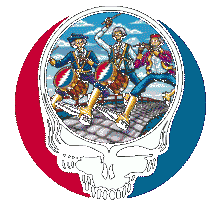Grisman Still Dawgin' It

From the Times Union:
A Dawg's life
Influential Grisman keeps blending styles, explaining his oddly named music
By MICHAEL ECK, Special to the Times Union
First published: Thursday, November 16, 2006
Mandolinist David Grisman calls his unique blend of styles "Dawg music," but he says the name "backfired on me, because I still have to describe it to people."
"(Grateful Dead guitarist) Jerry Garcia nicknamed me 'Dawg' when we were playing together in (the bluegrass collective) Old And In The Way in 1973," says Grisman, who returns with his quintet Saturday to the Troy Music Hall. "Everybody in that band had a nickname. That was mine, and when I started playing my own music, with my own group, people kept asking, what is this kind of music called? So I thought if I had a generic term they wouldn't bother be about it; I would just say it's Dawg music."
Grisman's latest effort, "Dawg's Groove," features a wildly eclectic mix of sounds, borrowing from across the spectrum of international music.
"I guess you'd say it's acoustic music, largely composed and arranged by myself," Grisman says when pressed for a more stringent definition of Dawg, "and reflecting many influences such as swing, bluegrass, Latin, gypsy, various ethnic musics; really, everything I've ever heard."
"I write tunes in different styles, basically," he says, a little exasperated, "and I play the mandolin."
Labels disliked
Like many musicians, Grisman bristles at the boxes used to describe, and even file, music in the press and music stores.
"Musicians don't want to be lumped into some vague general category like classical or jazz. They want to be known as individuals. The purveyors of music, the marketing people, need those tags, but I think the terms get way too general."
Grisman, however, owns his own label, Acoustic Disc, so he understands the pressure of categorization from both sides.
"You take on the burden of that when you start a label," he admits. "But there's still no Dawg box in the record store, so they always put my stuff into bluegrass, just because it has a mandolin on the cover. As a result I have Latin records in the bluegrass bin. They've just typecast me as bluegrass."
These are minor worries, though, once Grisman has a mandolin in his hands.
In the beginning
He can still recall the first time he heard the instrument, and in conversation he seems to be able to return to that moment easily.
"It was in my high school English class in New Jersey, and it was being played by a man named Ralph Rinzler, who was a great mandolin player and also an amazing folklorist," Grisman says. "He was a neighbor of mine and a family friend, and he took me under his wing."
Rinzler was a member of the influential urban hillbilly band, the Greenbriar Boys, and he also served as bluegrass originator Bill Monroe's manager.
"I credit Ralph as being my biggest influence, not only in terms of inspiring me as a mandolin player, but just on so many other levels on making records, on being interested in many kinds of music. He was an amazing guy."
Grisman also credits Saratoga Springs mandolin legend Frank Wakefield who actually replaced Rinzler in the Greenbriar Boys with helping him along the eight-string path: "Frank taught me all about Monroe's style, which he was and still is an expert on."
As a young picker, Grisman began his recording career with The Even Dozen Jug Band before moving on to typically eclectic bands like Earth Opera, Muleskinner and the Great American Music Band.
In the mid-1970s, he says, all of his varied influences began to coalesce into a form that was "beyond bluegrass."
Breaking ground
Dawg music was officially launched on the world with the release of 1977's landmark "The David Grisman Quintet" on Kaleidoscope Records.
Grisman says he knew he was breaking ground, "because all of the musicians I was working with felt that way, and told me so.
"I could see that there hadn't been this outlet for what were essentially bluegrass musicians to express themselves beyond the bluegrass format, and in a strictly instrumental setting," he says.
Grisman continues to stretch boundaries today, with the longest running edition of the once-volatile quintet (which currently features bassist Jim Kerwin, drummer George Marsh, flutist Matt Eakle and guitarist Enrique Coria).
"I have a great band," Grisman beams. "You play with the same musicians for years, and something happens there; it's just comfortable."
Mentor time
Grisman has also come full circle. More than 40 years after meeting Rinzler, he is now the mentor.
In 2004, with Mike Marshall and Chris Thile, he co-founded The Mandolin Symposium (which gives young players access to current greats), and a recent Grisman-produced Acoustic Disc release, "Tone Poets," features a bevy of very young, relatively unknown players.
"I've got these kids showing up all around the country at various gigs," Grisman says, "young kids who are going to be the great mandolin players of the future. I'm not the world's best teacher, but I enjoy helping other musicians and sharing whatever I know."
Michael Eck, a freelance writer from Albany, is a frequent contributor to the Times Union
David Grisman Quintet
When: 8 p.m. Saturday
Where: Troy Savings Bank Music Hall, 30 Second St., Troy.
Tickets: $26-$29
Info: 273-0038; http://www.troymusichall.org



2 Comments:
I have tickets to see him tomorrow night in Vermont. Looking forward to it. It's been a while.
Peace..................
I'm sure you'll have a great time, Helen. Enjoy!!!
Post a Comment
<< Home